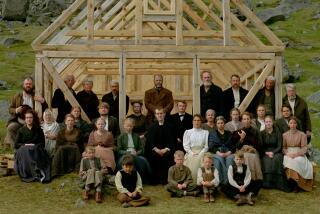Iceland Has a Word for It
- Share via
I hand the agent my brottfarerspjald, step on board Icelandair Flight 642. Just before takeoff, the flight attendant stands before us clasping a seat-belt buckle and droning through the oryggisbunadur um bord. Some five hours later, we begin our descent into Reykjavik. At the airport, I get my passport stamped at vagabraeftirlit, make a quick refresher stop in the snyrtingar, exchange dollars for kronurs at the gjaldeyrir and pick up tourist information at the upplysingapjonustu fyrir feroafolk.
I have come to this nation of 280,000 inhabitants, who speak to each other in a language that is incomprehensible to 19,999 of every 20,000 people on Earth, to see how they are holding up against the onslaught of English. Iceland’s linguistic patriots go to incredible lengths to preserve their language. Foreign words are ruthlessly screened out by a special agency, which also invents words for new things and ideas. There’s a word for everything in Icelandic -- or there will be shortly.
Icelanders have a strong belief in their own national greatness, and that conviction is rooted unshakably in language and words. Literacy isn’t a problem here; it’s a given. Icelanders believe that men and women should turn a verse as easily as they turn a profit, and both endeavors are considered important to one’s well-being.
Iceland has more bookstores per capita than any other nation in the world (“better shoeless than bookless” is an unofficial national motto). Sales of a new novel in Iceland will compare favorably with sales for a similar book in Britain -- while a volume of poetry would do even better in Iceland -- with a population about 1/200th that of Britain.
The most important tomes are the sagas. Written in the 12th and 13th centuries, these are the great prose narratives of medieval Iceland, bloodthirsty tales of Viking derring-do. Icelandic schoolchildren read their national literature exactly as it was written hundreds of years ago. Modern Icelanders speak virtually the same language as their forefathers of the 10th century. Tomorrow morning’s Reykjavik newspapers will be written in the same language as the ancient sagas -- that would be like this newspaper using Chaucerian English.
Language preservation worked nicely for centuries because Icelanders lived diphthongs apart from the rest of the world, but in recent decades the cultural floodgates have been opened. English is everywhere -- on televisions, VCRs, the Internet and commercial products.
It’s part of a global problem: About 400 million people speak English as their first language, an additional 700 million or so use it as a second language and a billion people more are struggling to learn how to speak it. Meanwhile, other languages are disappearing at the rate of two per month. There are about 6,800 languages in the world, but the expert consensus is that 400 of them will soon be extinct.
Why care? “When you lose a language,” the late linguistics professor Kenneth Hale once said, “you lose a culture, intellectual wealth, a work of art. It’s like dropping a bomb on a museum.”
The front line of Iceland’s preservation battle is in Reykjavik, the home of the Icelandic Language Institute (Islensk Malstod); this government agency was set up in 1964 to devise new words when existing language proves inadequate. When AIDS first came to national attention in Iceland, the main discussion was what to call it rather than how to prevent it. The institute does not believe that AIDS should be called AIDS, and thus the disease is officially known as alnaemi, an ancient Icelandic word meaning “totally vulnerable,” which the institute settled on after some three years of study.
The preservationists often resurrect words from the sagas. A computer is called tolva, a fusion of the old Icelandic words for number and prophetess, and a TV screen is a skjar, a sheep’s placenta once used by farmers as window panes. My favorite is friopjofur, the word for pager, which means “thief of peace.”
I left Iceland pessimistic. Everywhere I went, I heard English spoken. Though a written language can be purged of foreign words and phrases, policing how people speak is another matter. Many young Icelanders cannot be bothered with a language that is a minefield of subjunctive, inflections and gender (the number 2 has three genders).
In one sense, the Icelanders have no one to blame but themselves. Just as they have earnestly defended their language, they have with equal enthusiasm made sure that every schoolchild has a computer and learns English. Thus Microsoft sees no need to translate Windows into Icelandic. The publishers of popular books are beginning to skip translation as well. It’s what the Icelandic language purists call a sjalfhelda -- a Catch-22. I fear the handwriting is on the wall -- and it’s in English.
More to Read
Sign up for The Wild
We’ll help you find the best places to hike, bike and run, as well as the perfect silent spots for meditation and yoga.
You may occasionally receive promotional content from the Los Angeles Times.






